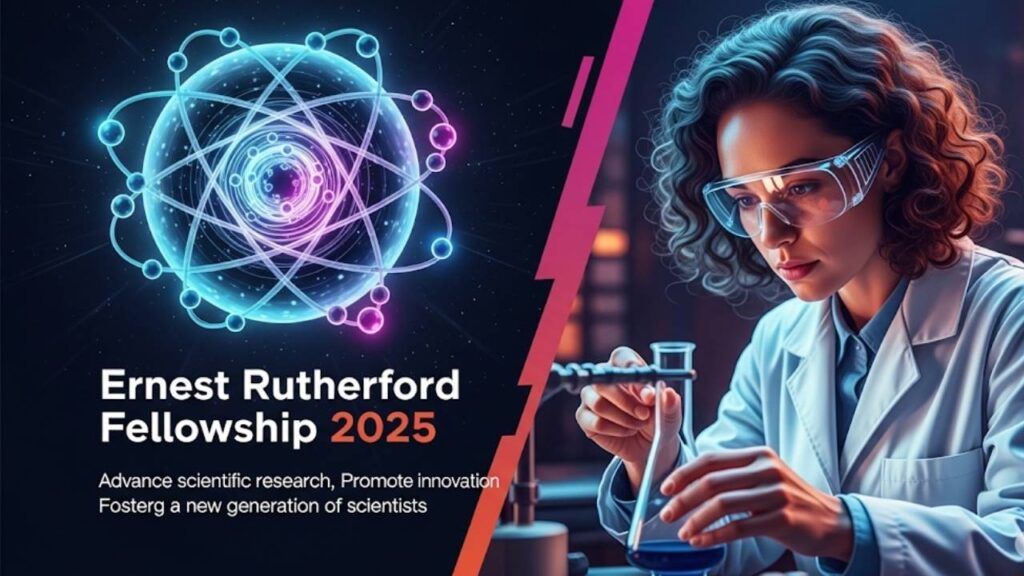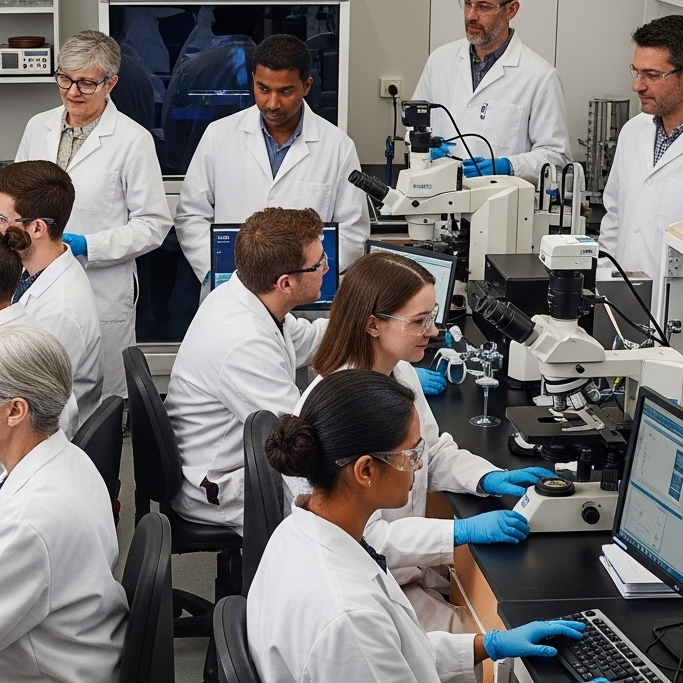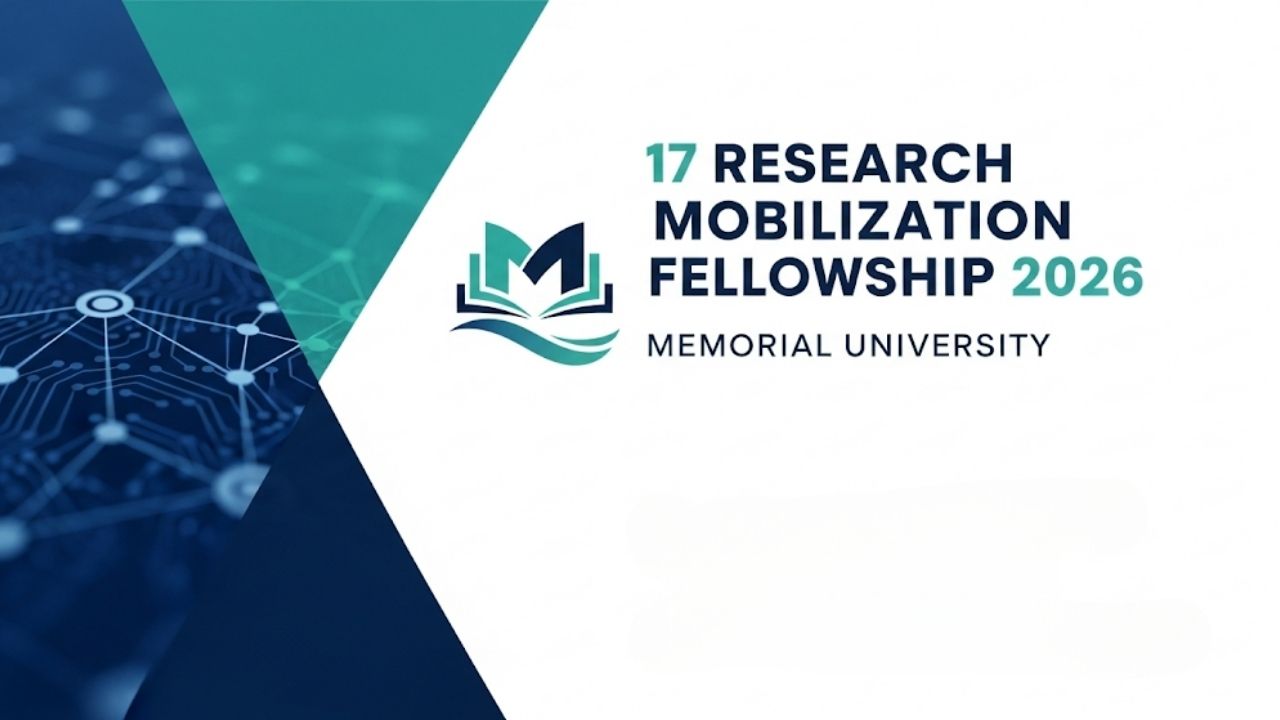Are you an ambitious, early-career researcher poised to make a significant impact in the world of science and technology? The Ernest Rutherford Fellowship 2025 is your gateway to establishing an independent and impactful research program in the UK. As someone who has advised numerous aspiring scientists, I’ve seen firsthand how this prestigious fellowship can transform careers, providing the essential support and freedom to pursue groundbreaking discoveries. This guide is crafted to give you clear, actionable, and encouraging insights to successfully navigate the application process and unlock your potential.

What is the Ernest Rutherford Fellowship?
The Ernest Rutherford Fellowship (ERF), funded by the UK’s Science and Technology Facilities Council (STFC), is a highly sought-after opportunity for early-career researchers to establish a creative, independent research program within STFC’s core science areas. These areas include, but are not limited to, particle physics, astronomy, nuclear physics, accelerator science, computational science, and quantum technologies. The fellowship aims to foster the next generation of scientific leaders, enabling them to pursue innovative research and contribute significantly to the UK’s scientific landscape.
Ernest Rutherford Fellowship 2025
| Key Fact | Detail/Statistic | Source (linked) |
| Funder | Science and Technology Facilities Council (STFC) | UKRI Website |
| Opportunity Status | Open | UKRI Website |
| Opening Date | June 4, 2025 | UKRI Website |
| Closing Date | October 1, 2025 (4:00 PM UK time) | UKRI Website |
| Duration | Five years | UKRI Website |
| Total Fund | £6,000,000 (total for the current call) | UKRI Website |
| Eligibility | Early career researcher, hold a PhD or equivalent experience, clear leadership potential, hosted by an eligible UK research organization with an STFC ERF quota. Not for those with a tenured academic lecturer-level position. | UKRI Website |
The Ernest Rutherford Fellowship 2025 represents an extraordinary opportunity for early-career researchers to carve out their niche and contribute meaningfully to scientific advancement. It’s a competitive landscape, but with a clear vision, a meticulously crafted application, and strategic engagement with potential host institutions, you can significantly enhance your chances of success. Don’t just aim to complete the application; strive to tell a compelling story of your scientific passion, your leadership potential, and the transformative impact your research will have. Begin your preparation now, connect with mentors, and embrace this exciting journey toward independent research.
Are You Eligible for the Ernest Rutherford Fellowship 2025?
Understanding the eligibility criteria is the crucial first step in your application journey. The Ernest Rutherford Fellowship is designed for early-career researchers who do not currently hold a tenured academic position at lecturer level or its equivalent. This is a vital point to remember – if you secure a lecturer-level position before the fellowship offer, you may become ineligible.
Key eligibility requirements include:
- Early Career Researcher: The fellowship targets individuals at the cusp of establishing their independent research careers. While there isn’t a strict “years post-PhD” limit, successful applicants typically have between 4-9 years of postdoctoral experience. However, STFC encourages applications from those with diverse career paths, including those resuming research after a career break.
- PhD Qualification or Equivalent: You must hold a PhD qualification or possess relevant experience and demonstrate clear leadership potential that can be considered equivalent to a PhD.
- Host Organization: You must be hosted by an eligible UK research organization that has an STFC ERF quota. Many universities run internal selection processes due to this quota system, so it’s essential to identify and connect with a potential host academic or department early in your process.
- Research Remit: Your proposed research project must fall within the remit of STFC’s core science program. This includes areas such as nuclear physics, astronomy, solar and planetary science, accelerator science, particle physics and astrophysics, computational science, and quantum technologies.

Navigating the Application Process for the Ernest Rutherford Fellowship 2025?
The application for the Ernest Rutherford Fellowship 2025 is a multi-faceted process that demands meticulous planning and compelling articulation of your research vision. Applications must be submitted via the UKRI Funding Service.
Here’s a breakdown of the typical steps involved:
- Identify a Host Institution and Sponsor: This is arguably the most critical early step. As mentioned, many UK universities operate an internal selection process due to STFC’s quota system. You’ll need to identify a host academic who is willing to sponsor your application and a department that aligns with your research. Reach out to the research support offices or relevant departmental contacts at your target institutions to understand their internal EOI deadlines and procedures.
- Develop Your Expression of Interest (EOI): If your chosen institution has an internal selection, you’ll likely need to submit an EOI. This typically involves:
- A concise outline of your proposed research, highlighting its significance and innovation.
- An academic-style CV.
- A list of your key publications or outputs.
- A statement explaining why you are the most appropriate person to deliver the research and how it aligns with the STFC remit and the host institution’s strengths.
- Craft Your Full Proposal: Once you’ve been selected internally (if applicable), you’ll proceed to develop your full application. This is where you bring your research vision to life. Key sections usually include:
- Vision: What are you hoping to achieve with your proposed work? This should be ambitious, yet achievable.
- Approach: How are you going to deliver your proposed work? This section requires a detailed methodology, demonstrating feasibility and how risks will be managed.
- Capability to Deliver: Why are you the right individual to successfully deliver this work? Highlight your relevant experience, skills, and aptitude. This is also where you can demonstrate your contributions to a positive research environment and wider community.
- Host Institution Fit: Explain why the chosen institution is the ideal place for your fellowship. What support will you receive, and how will it benefit your research program?
- Career Development: This is crucial. How will the Ernest Rutherford Fellowship provide a feasible and appropriate trajectory for your personal and professional development? How will you use this opportunity to instigate positive change in the wider research community (e.g., through Equality, Diversity, and Inclusion (EDI), public engagement, or policy influencing)?

A Personal Anecdote: I once worked with an applicant who had a truly brilliant research idea but struggled to articulate their long-term career vision. We spent weeks refining this section, tying their proposed research directly to their aspirations for future leadership and broader societal impact. That dedication paid off, as their application ultimately stood out. Remember, the STFC isn’t just funding a project; they’re investing in you as a future scientific leader.
Benefits of Becoming an Ernest Rutherford Fellow
Beyond the significant financial support for your research, the Ernest Rutherford Fellowship offers a multitude of benefits that can propel your career to new heights:
- Independent Research Program: This fellowship provides the freedom and resources to establish your own research agenda, allowing you to delve deep into your chosen field without the immediate pressures of securing multiple grants.
- Leadership Development: The scheme explicitly aims to develop future scientific leaders. This includes opportunities for professional development, networking, and taking on advisory or advocacy roles.
- Enhanced Employability: A significant proportion of past Ernest Rutherford Fellows secure permanent, senior academic positions after their fellowships, demonstrating the scheme’s effectiveness in fostering long-term careers in research.
- Prestigious Recognition: Being an Ernest Rutherford Fellow is a mark of excellence, signaling your potential and contributions to the scientific community.
- Networking Opportunities: You’ll become part of a cohort of talented fellows, with opportunities for collaboration and mentorship within the STFC and wider UK research ecosystem.
Advice for a Standout Application
To make your Ernest Rutherford Fellowship 2025 application truly shine, consider these tips:
- Clarity and Conciseness: While the application allows for detailed explanations, every word should count. Avoid jargon where possible, and when necessary, explain complex terms clearly.
- Strong Research Vision: Your research proposal should be innovative, timely, and demonstrate clear potential for advancing understanding in your field. Articulate its potential impact on world-leading research, society, economy, or environment.
- Demonstrate Leadership Potential: Provide concrete examples of your leadership skills, initiative, and how you have contributed to the research community. This isn’t just about managing a lab; it’s about your broader influence and vision.
- Highlight Fit with Host Institution: Show genuine alignment with your proposed host institution’s research strengths and resources. Explain how their environment will enable your success and vice-versa.
- Emphasize Career Development: Detail how the fellowship will specifically help you achieve your long-term career goals and how you plan to contribute to the wider research and innovation community.
- Proofread Meticulously: A polished application reflects your professionalism. Typos or grammatical errors can detract from even the most brilliant ideas.
Your Definitive Guide to the ANZSOG Academic Fellowships 2026 for International Scholars
Charting Your Path to Impact: The GDF Conservation and Communities Fellowship 2025
FAQ
Q1: What is the average postdoctoral experience for successful Ernest Rutherford Fellowship applicants?
While there is no strict limit, successful applicants typically have between 4-9 years of postdoctoral experience. However, STFC encourages applications from diverse career paths, including those with career breaks.
Q2: Can I apply for the Ernest Rutherford Fellowship if I already hold a lecturer position?
No, the Ernest Rutherford Fellowship is intended for early-career researchers who do not hold a tenured academic position at lecturer level or its equivalent. If you secure such a position before the fellowship offer, you will be ineligible.
Q3: How do I find an eligible UK research organization to host my fellowship?
You should research UK universities and research institutions with strong departments in STFC’s core science areas (e.g., particle physics, astronomy, nuclear physics). Contact their research offices or relevant departmental heads to inquire about their internal processes for hosting Ernest Rutherford Fellows. Many institutions will have information on their websites regarding these fellowships.










